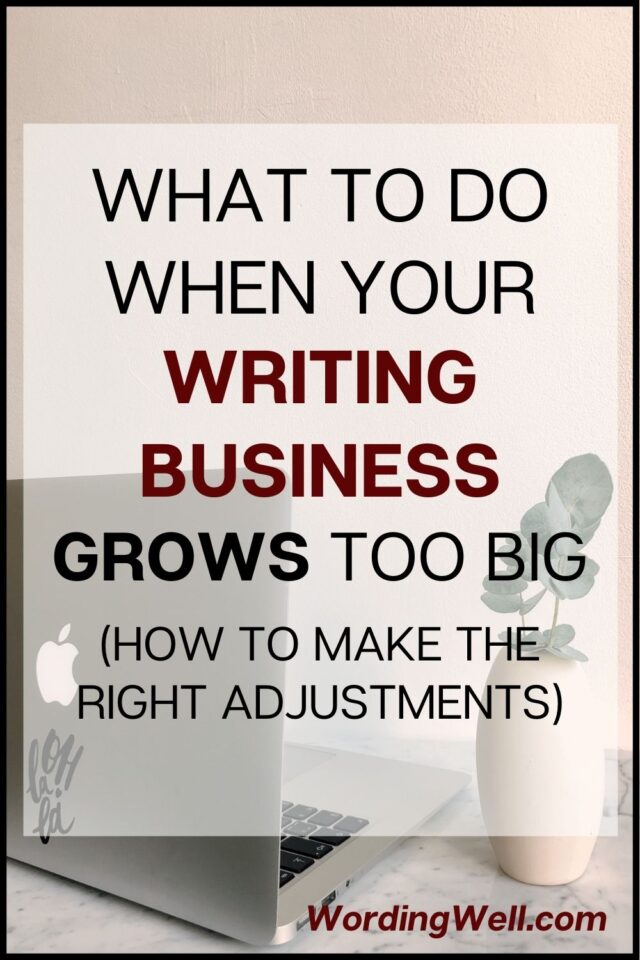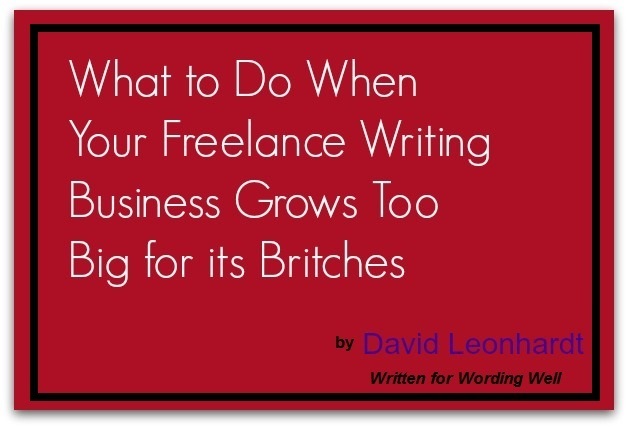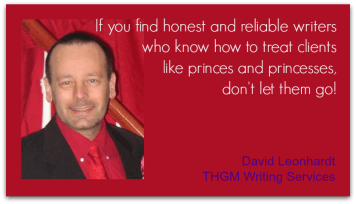Last Updated on: November 28th, 2021
Today’s guest, David Leonhardt, is an entrepreneur who runs a writing agency, and he is going to share with you what you can do when YOUR freelance writing business grows too big for its britches! Pay careful attention to the many tips he provides, as they could take your business to the next level!
Now please welcome David to center stage!
What to Do When Your Writing Business Grows Too Big for its Britches
What happens when your workload grows bigger than you? You clone yourself, of course.
Due to the lack of reputable cloning facilities in this nameless hamlet where I live, many years ago I developed a different option. I opened a freelance ghostwriter agency, where I coordinate the efforts of a dozen writers.
Moving from freelancer to agency isn’t for everybody, and it doesn’t just happen without growing pains. I am happy to share my experience, and describe some of the key aspects.
Because “writing” is such a large field, I should define what aspects my team and I are involved in.
ONLINE and OFFLINE WRITING
First, we have two streams that rarely overlap.
There is the online writing, which includes business blogging, website copy, e-books and press releases. These are almost always business clients who want content for boosting their reputation, their conversions, or their search engine rankings (or some combination of the three. Some are ghostwriting, and some are not. And often there is a promotional aspect that goes along with it.
For online projects, which tend to be smaller and more numerous than offline projects, the team shifts from project to project, often involving multiple colleagues, depending on what the client needs. I tend to do much of the actual writing myself for these smaller projects, except when a project requires multiple writers and assemble a team on the go for the promotion and influence marketing aspects.
Then there is the offline stream, which is mostly book manuscripts (fiction and biography, as well as some business, self-help and other genres), but also includes screenplays and speeches, as well as press releases and reports (the latter two being the main areas of overlap between online and offline work). This is pretty much all ghostwriting.
Most of these are bigger projects and are assigned to specific members of my team, although I take on some of them myself. I have just completed a book about stock market investing from the kitchen table and I am almost finished a manuscript on pre-marital preparation (so I have some time freed up to take on a couple new book projects – hint, hint).
What we don’t do are business plans, résumés, technical writing or homework (articles for academic journals are fine, though). Sorry, you’ll have to go to a specialist for those specialized types of writing.
What follows applies mostly to offline writing, which is purer writing and less marketing.
RECRUITING
The first question you probably would ask is, “How do you find your writers?”
That’s the easy part. Every week, one or two find me. I think I have a list of 200 or more. However, I stick to my tried and true writers, and you will understand why after a story I relate further on in this post.
So why do I hang on to emails and résumés of over 200 writers? Because three years from now, I might have a request from a chef in a swanky London hotel to write a tell-all book, and, “Can I please have a writer who understands what goes on behind the scenes in a kitchen?” Through the magic of technology, I have a whole pile of CVs and writing samples I can search to see if I have access to such a writer.
PAPERWORK
There is more than one way to structure a ghostwriter agency.
1. You could hire writers as employees if you find you have enough steady work that you will never be paying for downtime. Not being suicidal, I don’t do this.
2. You could operate strictly as a referral business, and wash your hands once the client is connected with the writer.
3. Or you could be the contractor with the client, and the writers could be subcontractors. I do it this way. This means that you need to have contracts with your subcontractors so that they are representing your agency when they deal with clients. Key items to include are non-disclosure to protect clients who do not wish to be identified or be seen having a relation with a ghostwriting service, and a non-compete clause to protect yourself from cannibalism (the figurative kind, of course).

CONTRACTS
Then you need to have a contract with your client. The key thing to include in this contract is copyright (There is good info on Canadian copyright laws and US copyright laws if you click though). In fact, it would be so easy to just work from a handshake and invoicing, except that it is pretty important that you formally assign copyright to your clients in a contract. This is particularly important because they will be handing money over to you and getting writing back from a different person. So best to make it clear in writing.
A few other things you will want in the contract are the price and payment schedule because you want to get paid, and some specifics about the deliverables. I have found through experience that:
1) It is best to give a word count range, such as 50,000 – 60,000 words. On the one hand, you don’t want it wide open, because the client doesn’t know if he is paying for a booklet or a The Lord of the Rings. On the other hand, you don’t want the writer to spend a lot of effort trying to hit an exact number of words. Adding 500 words just to meet a quota usually makes a manuscript worse.
2) It is best to be imprecise about the timeline. Here is how I usually word it:
July 31, 2015 is the date on which it is estimated this project will be completed in its entirety. (Note that this timeframe is dependent upon the Subcontractor’s and the Client’s availability. Client shall have all creative control and final approval.)
What you do not want to have to do, if it can be avoided, is spend a lot of time chasing after the client for information. Nor does your writer want to do this. Most clients will fail to meet a predetermined schedule, but will still be reasonable. his includes B2B clients, too, not just regular folks. This clause allows you to account for other things happening in the client’s life or business without failing to deliver as promised.
You will also want to cover confidentiality and possibly define the research involved. The golden rule is to include any expectation that any party might have so that it is defined either precisely or within a range. The range, however, should only be for those aspects that are required in order to provide the best creative work; for me, that means word count and timeline.
WORKFLOW
I like to stay out of my writers’ faces. I have incredibly reliable writers with whom I have been working for years. I know I can rely on them and I trust them. They are worth their weight in gold. I step in if something doesn’t go as planned.
For instance, we recently had two clients come back to us from oblivion. Both had come back at the same time, after having seemingly abandoned their projects (yes, that actually happens more than you would think) and they were both assigned to the same writer. But that writer already had a crushing load in her personal life as well as her writing projects; she could not mobilize instantly. So there were expectations to be managed and some highly charged emotions.
If you take on a new writer, keep close tabs on him/her. You can vet them for the quality of their writing, but you’ll never know how they will treat the customers until you hand them some to treat.
TRUE STORY
I had just taken on a new fiction writer who showed a lot of promise. I handed her a fiction client, and off they went.
About mid-way through the project, she asked for more money. I was a little confused. I tried to understand how the specs had changed. After a few communications back and forth with her and with the client (including one phone call that got my wife and I out of bed at night), it became clear that the specs had not changed. She simply wanted more money. Don’t we all?! But we don’t shake down our clients mid-way through a project.
So I was ready to assign another writer.
Unfortunately, the client had fallen in love with her (as a writer, of course). He did not want me to change writers, so how much would he have to pay to keep her on? I was mortified at giving in to extortion like that, but the customer is always right. The price was increased, the client paid, she completed the manuscript and the client was tickled pink.
And that was the last she saw of me. She was a superb writer, but a slimy human being.
You know what the strangest thing is about this story? The exact same thing happened a year later with another new writer and another client. The exact same thing – as if they were reading from a script.
So if you find honest and reliable writers who know how to treat clients like princes and princesses, don’t let them go!
The truth is that most things go fairly smoothly running a freelance ghostwriting service. It’s for those times when things don’t go smoothly that you need to prepare. For most people, it’s just as easy to be a freelancer than to coordinate freelancers. You get to write…just write.
Your Turn:
Is your freelancing business growing fast enough for you?
Have you had to hire writers to help you… ever?
What other kinds of obstacles are you facing with your freelancing business that you might need help with?
Share in the comments, please!
Since 2002, David Leonhardt has been running The Happy Guy Marketing, the place to hire ghostwriters in Canada and the United States. He also spends a lot of time helping clients with their content marketing, and he invites you to follow him on Twitter and Pinterest (ask for an invite to pin to his four group boards on writing, travel, business, and being frugal).
Did You Know You Could Become a Freelance Editor?
Being a freelance editor, in my opinion, is even better than being a freelance writer. First of all, it pays more. Secondly, it is the best job I could ever ask for. I love editing, I love words, and I love helping others. Finally, I love reaping the many rewards (check out the many benefits of being a freelance editor).
If you are not currently working at your dream job and want to be a freelance editor, then sign up to get on the “interest list” for my upcoming course!
I am in the process of designing a course that will teach you EVERYTHING about being a work-from-home editor and entrepreneur.
This includes:
– how to get paid up-front… ALWAYS! (before you do any work)
– how to get testimonials
– how to market yourself
– where to find work
– how to leverage social media for your business (because, YES, you will be actually running a business if you are successful!)
– how to keep accurate records
– how to easily calculate your costs
– how to communicate with potential clients so they turn into ACTUAL clients
– how to organize your time (so you can complete all of the tasks involved in running your biz)
– how to deal with difficult clients
– which projects to accept
– when to raise your rates
– AND MORE! (INCLUDING BONUSES!)
Plus, I want to get to know you so that I can give you EXACTLY what you need to succeed!
So, DO you want to know more about how to become a freelance editor?
If so, SIGN UP HERE.



